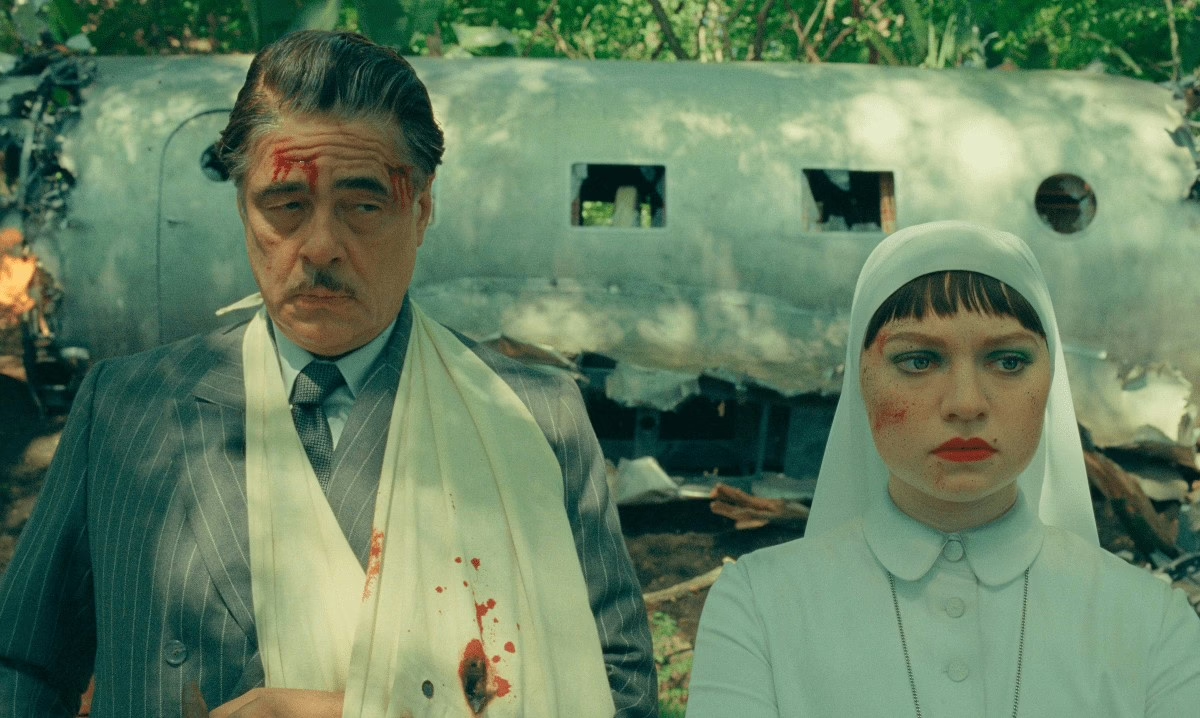With a highly recognizable cast, star power could easily overshadow character identity. But unlike “Asteroid City,” where Bill Murray and Scarlett Johansson simply looked like themselves, “The Phoenician Scheme” doesn’t fall into this trap.
As for the plot, I can’t be the first to say I’m a little confused.
In his first full-length feature film since 2023’s “Asteroid City,” Wes Anderson brings a darkly comic approach to a convoluted plot—a signature for the acclaimed director. In “The Phoenician Scheme,” an estranged and found family struggles through a chaos of their own making.
Benicio del Toro plays protagonist Zsa-zsa Korda, a scheming businessman determined to secure funding for his (minimally explained) mass-infrastructure project. Basically, world domination. Threapleton plays his estranged daughter Liesl, a nun experiencing something of an identity crisis. Reluctantly, Liesl becomes a business partner and future heir to the family business. Despite her reservations, Liesl’s commitment to Zsa-zsa’s wild schemes grows stronger as the film progresses.
The conflict in “The Phoenician Scheme” is established within the first minute of the film. But from there, more questions arise. Zsa-zsa Korda is a wanted man, narrowly avoiding assassination attempts multiple times. Poisoned food is casually pushed aside, and del Toro takes over as pilot in a sabotaged plane with ease. A shadowy team of government operatives, meanwhile, watches Korda’s every move. While their stake in Korda’s project feels undefined, their actions rely on the dark humor signature to Anderson’s films.
The “scheme” of the movie revolves around “The Gap.” Explained briefly, “The Gap” is an economic scheme to fund Zsa-zsa’s grandiose infrastructure project. “The Phoenician Scheme” is structured around a series of investor meetings, where Korda begs close family and colleagues to cover “The Gap” in project funding.
As in recent years with “The French Dispatch” and “Asteroid City,” Anderson assembles an ever-growing cast of A-List stars, including Scarlett Johansson and Jeffrey Wright (both from “Asteroid City”), Benedict Cumberbatch, Michael Cera, Riz Ahmed, Tom Hanks, Bryan Cranston, Bill Murray, Willem Dafoe, Hope Davis, and Rupert Friend.
Anderson has always maintained a longtime cast: Bill Murray, here with a smaller role, is among them. The Wilson brothers–Owen and Luke–are absent. However, their humor, like in “The Darjeeling Limited” or “Bottle Rocket,” was replaced by Michael Cera’s role as Bjorn.
Alongside these established names, Mia Threapleton stars as Liesl, a nun and Zsa-Zsa’s daughter. The daughter of Kate Winslet and filmmaker Jim Threapleton, “The Phoenician Scheme” marks Threapleton’s first big-budget role.
As comic relief, Michael Cera plays the family’s tutor and assistant, complete with a silly European accent. Together, the three are at the heart of the film. With such a stacked cast, del Toro, Cera, and Threapleton give the film a refreshing feel–none of them are regulars in Wes Anderson’s filmography.
Easier to digest is perhaps Anderson’s most iconic element: set design and fashion. Arguably, Anderson’s recognizable color palette and affinity for symmetrical camera shots have run their course. In 12 full-length feature films released over the past 30 years, Anderson’s defining aesthetic is no longer groundbreaking, and hasn’t been for years. That being said, he’s got it down to a science.
The fashion, in particular, is a high point. In “The Phoenician Scheme,” nuns have never felt more stylish. In a comically short dress for a nun, Liesl seems to enjoy touches of the Catholic aesthetic without full commitment to the faith. Her character wears sheer, bright green tights and absentmindedly swiped-on teal eyeshadow. With a deadpan expression and a white veil, Anderson has yet again created an instantly recognizable character design–one to rival Margot Tenenbaum in “The Royal Tenenbaums.”
Wes Anderson’s “The Phoenician Scheme” is another good, but not spectacular, effort that takes elements from previous works to create something new, but not wholly unfamiliar. With so many iconic films behind him, it’s hard for Anderson to truly break the mold at this point.
What does stand out is the obvious humor. “The Phoenician Scheme” repeats a number of jokes throughout the film. Zsa-zsa always survives the assassination attempt–another airplane sabotage. Or, a grenade is handed out like candy, and the recipient casually thanks the person offering. In another sillier moment, Bryan Cranston and Tom Hanks’ characters compete in a high-stakes basketball game against Riz Ahmed and del Toro for a business deal.
At the heart of these more slapstick jokes is Michael Cera. Like the comic relief Cera offered in “Barbie” as Alan, Cera is the perfect sidekick as Bjorn, the insect-obsessed family tutor. As the plot intensifies, Bjorn remains naively out of touch with the obvious tension. For the most part, only Liesl sees things from the audience’s perspective.
Del Toro’s Zsa-zsa Korda drives the plot and sets the tone. “Myself, I feel very safe,” he repeats at the film’s tensest points. Despite a number of absurd, unsurvivable assassination attempts and business failures, Korda emerges unflappable–in turn, the whole cast feels unstoppable.
In other hands, such a bizarre plot and expansive cast could have fallen flat. But with Anderson’s meticulous creative direction, it might just work. While some moments might get audiences rolling their eyes–or annoyed by bits of economic jargon–it stands as another great addition to the Wes Anderson filmography.

Holly Brusse is a first-year student at Seattle Central College. Her interest in journalism started when she joined her high school newspaper during her sophomore year of high school. She enjoys writing on politics, music, and pop culture. Outside of school she enjoys listening to music, painting in watercolor, and spending time with her cat.







Be First to Comment